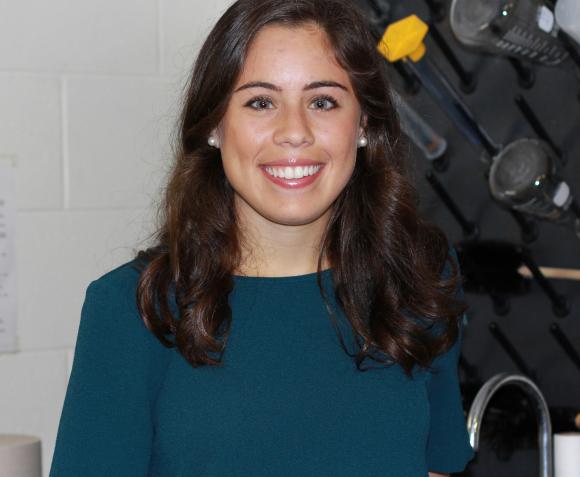Going Where We Are Needed
By Shannon E. Brewer ’03
“Founded by the Sisters of the Holy Cross in 1844, Saint Mary’s College promotes a life of intellectual vigor, aesthetic appreciation, religious sensibility, and social responsibility. Saint Mary’s is a Catholic, residential, women’s, liberal arts college offering undergraduate degrees and co-educational graduate programs.
A pioneer in the education of women, the College fosters an inclusive, academic community where students discover and develop their talents as they prepare to make a difference in the world. All members of the College contribute to this mission in their response to the complex needs and challenges of contemporary life.”
—Saint Mary’s College Mission Statement
Communicative disorders professor Susan Latham ’91 works with Danny, a client of Saint Mary’s Speech-Language-Hearing Services.
Saint Mary’s continues to live by the tenet set by the College’s founders, the Sisters of the Holy Cross, to go where we are needed. This year, with this directive in mind, the College has established a new communicative disorders major. The major, which prepares students for careers in speech and language pathology, audiology, and other speech and hearing professions, has been a minor here since 1995. But according to Assistant Professor Susan Latham ’91, coordinator of the communicative disorders program, two very important factors inspired her to broaden the program. “We needed a major program here,” she says, “because the students demanded it, and my profession needs it.” There is a growing need for speech and language pathologists throughout the country, and students with an interest in providing those kinds of services are responding to that need.

Ashley Moritz ’09 designed a therapy program for Danny, whom she works with each week.
With the assistance of the College’s curriculum committee, Latham designed the major program, which became official this year. Now Saint Mary’s provides the only communicative disorders program in northern Indiana. The communicative disorders program is an intensive study of speech, language, and hearing disorders, mild to severe, in populations, infant to elderly. Research and study prepares students to work with the population they choose. They learn, for example, to guide stroke victims through recovery of their speech and language, diagnose and help treat children with speech delays, or work with infants in need of feeding therapy.
For students, the new major is a pathway to another career choice that they have readily embraced. According to Latham’s November 2008 count, there are currently 21 students planning to major in communicative disorders, along with 19 intended minors. Amanda Blackwell ’09 is a double major in communicative disorders and education. She is preparing for graduate coursework and an eventual career as a speech and language pathologist (SLP). “I have a strong desire to work with children who have autism,” she explains. “While growing up in Columbus, Ohio, I worked with a family who had quintuplets. One of the children is profoundly hard of hearing.” Blackwell was fascinated by the job of the SLP who came to work with her young charge. “But it wasn’t until I took Introduction to Communicative Disorders with Dr. Latham that I began to seriously contemplate making it my career.” Blackwell is now the president of the Communicative Disorders Club, a student group on campus that promotes the profession and brings awareness to the populations the students serve.

Latham ’91 with communicative disorders majors Amanda Blackwell ’09, Kendra Fallet ’10, and Ashley Moritz ‘09.
Blackwell is already working with the children she’s interested in helping after graduation. Perhaps the most profound and impactful parts of the program are the hands-on learning components. “Hands-on learning experiences really enhance learning in the classroom. I don’t think we could do what we do on a daily basis without having had some direct interaction with clients,” says Blackwell.

Ten-year-old Danny works on pronouncing words he’ll use in everyday life, like “slushy,” one of his favorite treats.
Throughout their courses, communicative disorders majors put theory into practice, applying their study and research of speech and language to real-life client situations. They also learn the ins and outs of the speech and hearing sciences and participate in supervised therapy through various internships, volunteer positions, and the Speech-Language-Hearing Services at Saint Mary’s College program.
Blackwell and a fellow classmate Ashley Moritz ’09, a double major in communicative disorders and psychology, have been profoundly affected by their work with clients through Speech-Language-Hearing Services. Moritz works with one client, 10-year-old Danny, one day a week as part of a clinical practicum class. Danny has difficulty producing certain sounds and Moritz has designed a therapy program for him, which they work on together during his visits. After five weeks of preparation in the clinical practicum class, Moritz researched Danny’s background and spoke with his mother to learn more about his needs. “With all of this information, I came up with some long-term objectives to design the therapy sessions around,” she says. But, as with most clients, Moritz finds herself constantly adapting her original plan to accommodate Danny’s needs. “As we progress, I am constantly evaluating his performance on the speech and language activities we do. As his communication skills develop, I am modifying the objectives we focus on in therapy to meet his needs.”

Latham ’91 and Danny’s mom, Kathy Ratkiewicz, watch Danny’s therapy session from the observation room.
Therapy takes place in Spes Unica Hall, Saint Mary’s new academic building. In the Department of Psychology and Communicative Disorders, there is a lab filled with toys and books, all colorful tools that engage children during sessions. The therapy that takes place here and the bonds students form with their clients are at the heart of the communicative disorders program. “I think that working with Danny has been great,” says Moritz. “I feel much more prepared for the career path I have chosen to pursue. Through internships and work experience with children, I have learned to follow each child’s lead and to learn what motivates each one of them.”


